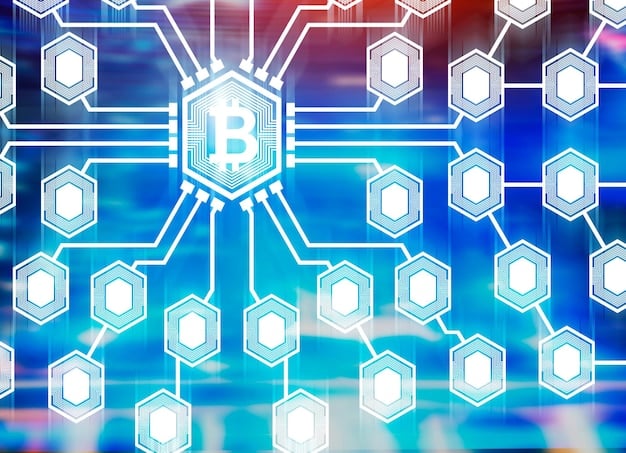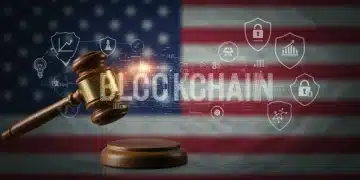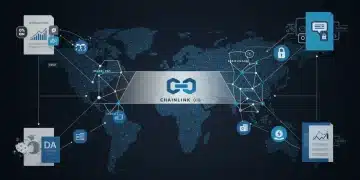Altcoin Security Audits: Vulnerability Assessment and Protocol Resilience

Altcoin security audits are comprehensive evaluations designed to identify vulnerabilities and bolster the resilience of blockchain protocols, ensuring the safety and reliability of decentralized systems.
In the rapidly evolving world of cryptocurrencies, Altcoin Security Audits: Assessing the Vulnerabilities and Resilience of Blockchain Protocols have become indispensable for safeguarding digital assets and ensuring the integrity of blockchain networks. These audits play a crucial role in identifying potential weaknesses and vulnerabilities within altcoin protocols, providing invaluable insights for developers and investors alike.
Understanding the Importance of Altcoin Security Audits
Altcoin security audits are essential for verifying the security and reliability of blockchain-based systems. These audits function as comprehensive health checks, probing for vulnerabilities that could be exploited by malicious actors. Let’s explore why they are so critical in the altcoin landscape.
What is a Security Audit?
A security audit is a systematic assessment of a system’s security posture. In the context of altcoins, this involves reviewing the code, architecture, and deployment practices of the blockchain protocol.
Why are Security Audits Needed?
Security audits are needed to identify and address potential vulnerabilities before they can be exploited. This helps to protect users and investors from financial losses and reputational damage.
- 🔍 Identifies vulnerabilities: Audits uncover weaknesses in the code and design.
- 🛡️ Protects users: Ensures user funds and data are safe.
- 📈 Builds trust: Demonstrates a commitment to security, increasing investor confidence.
- ✅ Ensures compliance: Helps projects meet regulatory requirements.
In essence, security audits act as a preventative measure, mitigating risks and reinforcing the overall stability of altcoin projects. By addressing potential issues early, projects can avoid costly and damaging incidents.

Key Components of an Altcoin Security Audit
An altcoin security audit is a multi-faceted process that involves several key components, each designed to uncover potential vulnerabilities in the blockchain protocol. Below is a breakdown of these components, providing a clear understanding of what a comprehensive audit entails.
Code Review
The code review is a meticulous examination of the altcoin’s source code. Auditors analyze the code line by line, looking for logic errors, security flaws, and other potential issues.
Smart Contract Analysis
For altcoins that utilize smart contracts, the audit includes a detailed analysis of these contracts to ensure they function as intended and are free from vulnerabilities.
Testing
Testing involves simulating real-world scenarios to identify potential weaknesses in the system. This includes penetration testing, fuzz testing, and other techniques.
- 💻 Static Analysis: Examining code without executing it.
- 🔨 Dynamic Analysis: Analyzing code during runtime, simulating real-world conditions.
- 🧪 Penetration Testing: Attempting to exploit vulnerabilities to assess the system’s security.
- 📚 Formal Verification: Using mathematical methods to prove the correctness of the code.
These components work in concert to provide a comprehensive assessment of the altcoin’s security posture. By thoroughly examining the code, smart contracts, and system behavior, auditors can identify and address vulnerabilities before they can be exploited by malicious actors.
Common Vulnerabilities Found in Altcoin Protocols
Altcoin protocols, like any software, are susceptible to various vulnerabilities. Identifying and understanding these common weaknesses is crucial for both developers and investors. Let’s take a look at some of the most prevalent.
Reentrancy Attacks
Reentrancy attacks occur when a smart contract makes an external call to another contract before updating its own state. This can allow the external contract to call back into the original contract multiple times, potentially draining its funds.
Integer Overflow/Underflow
Integer overflow and underflow vulnerabilities occur when a mathematical operation results in a value that is either too large or too small to be stored in the available memory space. This can lead to unexpected behavior and security breaches.
Denial of Service (DoS) Attacks
DoS attacks aim to disrupt the normal operation of a system by overwhelming it with requests, making it unavailable to legitimate users.
- 🔒 Insufficient Gas Limit: Contracts may run out of gas during execution.
- 🕳️ Front Running: Transactions are manipulated before they are included in a block.
- 🕸️ Time Manipulation: Exploiting vulnerabilities related to block timestamps.
By understanding these common vulnerabilities, developers can take proactive steps to mitigate risks and ensure the security of their protocols. Investors can also use this knowledge to assess the security of altcoins before investing.

The Role of External Auditors in Enhancing Security
External auditors play an indispensable role in enhancing the security of altcoin protocols. They bring a fresh perspective and specialized expertise that can uncover vulnerabilities that might be missed by internal teams. Understanding their role and responsibilities is key to fostering a secure blockchain ecosystem.
Objectivity and Independence
External auditors provide an unbiased assessment of the system’s security, free from internal biases or conflicts of interest. This ensures that vulnerabilities are identified and addressed without compromise.
Expertise and Specialization
These auditors possess specialized knowledge and experience in blockchain security. They stay up-to-date with the latest threats and vulnerabilities, bringing cutting-edge techniques to the audit process.
Comprehensive Analysis
External auditors conduct thorough and comprehensive analyses, examining all aspects of the protocol, from code review to smart contract analysis and testing.
- 📜 Standard Compliance: Ensuring adherence to security standards and best practices.
- 🤝 Collaboration: Working with development teams to address identified issues.
- ℹ️ Knowledge Sharing: Providing insights and recommendations to improve security practices.
In summary, external auditors act as crucial guardians of altcoin security, providing objective, expert, and comprehensive evaluations that help to protect users and investors from potential threats.
Best Practices for Conducting Effective Security Audits
Conducting effective security audits requires adherence to best practices that ensure thoroughness, accuracy, and relevance. By following these guidelines, altcoin projects can maximize the value of their security audits and create more resilient systems.
Establish Clear Objectives
Before starting the audit, define clear objectives and scope. This ensures that the audit focuses on the most critical areas and addresses the specific concerns of the project.
Choose the Right Auditors
Select auditors with proven expertise and a strong track record in blockchain security. Look for firms that have experience with similar projects and technologies.
Provide Full Access
Give auditors full access to all relevant code, documentation, and systems. This enables them to conduct a thorough and comprehensive assessment.
- ⏱️ Regular Audits: Conducting audits on a regular basis to keep pace with evolving threats.
- 🛠️ Remediation: Promptly addressing vulnerabilities identified during the audit.
- 📢 Transparency: Sharing audit results with the community to build trust and confidence.
Adhering to these best practices ensures that security audits are effective, providing valuable insights and recommendations that enhance the security and resilience of altcoin protocols.
The Future of Altcoin Security Audits
As the blockchain landscape continues to evolve, the future of altcoin security audits will be shaped by new technologies, emerging threats, and increasing regulatory scrutiny. Staying ahead of these trends is essential for maintaining the security and integrity of decentralized systems.
AI and Automation
Artificial intelligence (AI) and automation tools are poised to play a significant role in future security audits, enabling faster and more comprehensive analyses. These technologies can identify patterns, anomalies, and potential vulnerabilities that might be missed by human auditors.
Formal Verification
Formal verification, which uses mathematical methods to prove the correctness of code, is gaining traction as a powerful tool for ensuring the security of smart contracts. This approach can provide a higher level of assurance than traditional testing and code review.
Regulatory Compliance
As regulatory scrutiny of the cryptocurrency industry increases, security audits will become even more important for demonstrating compliance with legal and regulatory requirements. Projects that prioritize security and undergo regular audits will be better positioned to navigate the evolving regulatory landscape.
- 🌐 Cross-Chain Security: Addressing security challenges in cross-chain interoperability.
- 🛡️ New Threat Vectors: Adapting to emerging threats such as quantum computing and sophisticated hacking techniques.
- 🤝 Community Involvement: Encouraging greater community participation in security audits and vulnerability disclosure programs.
The future of altcoin security audits is dynamic and promising, with new technologies and approaches set to revolutionize the way we protect decentralized systems. By embracing these advancements and staying ahead of emerging threats, we can build a more secure and resilient blockchain ecosystem.
| Key Point | Brief Description |
|---|---|
| 🔍 Importance of Audits | Security audits are essential for identifying vulnerabilities and protecting altcoins from potential exploits. |
| 🛡️ Key Components | Code review, smart contract analysis, and testing are vital components of a comprehensive audit. |
| ⚠️ Common Vulnerabilities | Reentrancy attacks, integer overflows, and DoS attacks are among the most common vulnerabilities. |
| ✅ Best Practices | Establish clear objectives, choose the right auditors, and provide full access to ensure effective audits. |
FAQ
An altcoin security audit is a comprehensive review of an altcoin’s code and systems to identify potential vulnerabilities and security risks, ensuring the safety and integrity of the blockchain.
Security audits help identify and fix potential vulnerabilities before they can be exploited by attackers, protecting user funds and maintaining trust in the altcoin project.
Common vulnerabilities include reentrancy attacks, integer overflows, denial-of-service attacks, and smart contract bugs, which can lead to significant financial losses.
Altcoins should undergo security audits regularly, especially after significant code changes or updates, to ensure that new vulnerabilities are promptly identified and addressed.
External auditors provide an unbiased and expert review of the altcoin’s security, bringing specialized knowledge and tools to uncover vulnerabilities that internal teams may miss.
Conclusion
In conclusion, **Altcoin Security Audits: Assessing the Vulnerabilities and Resilience of Blockchain Protocols** are vital for maintaining the integrity and trustworthiness of the cryptocurrency ecosystem. By understanding the importance of these audits, key components, common vulnerabilities, and best practices, both developers and investors can make informed decisions to protect their assets and promote the growth of secure and reliable blockchain networks.





